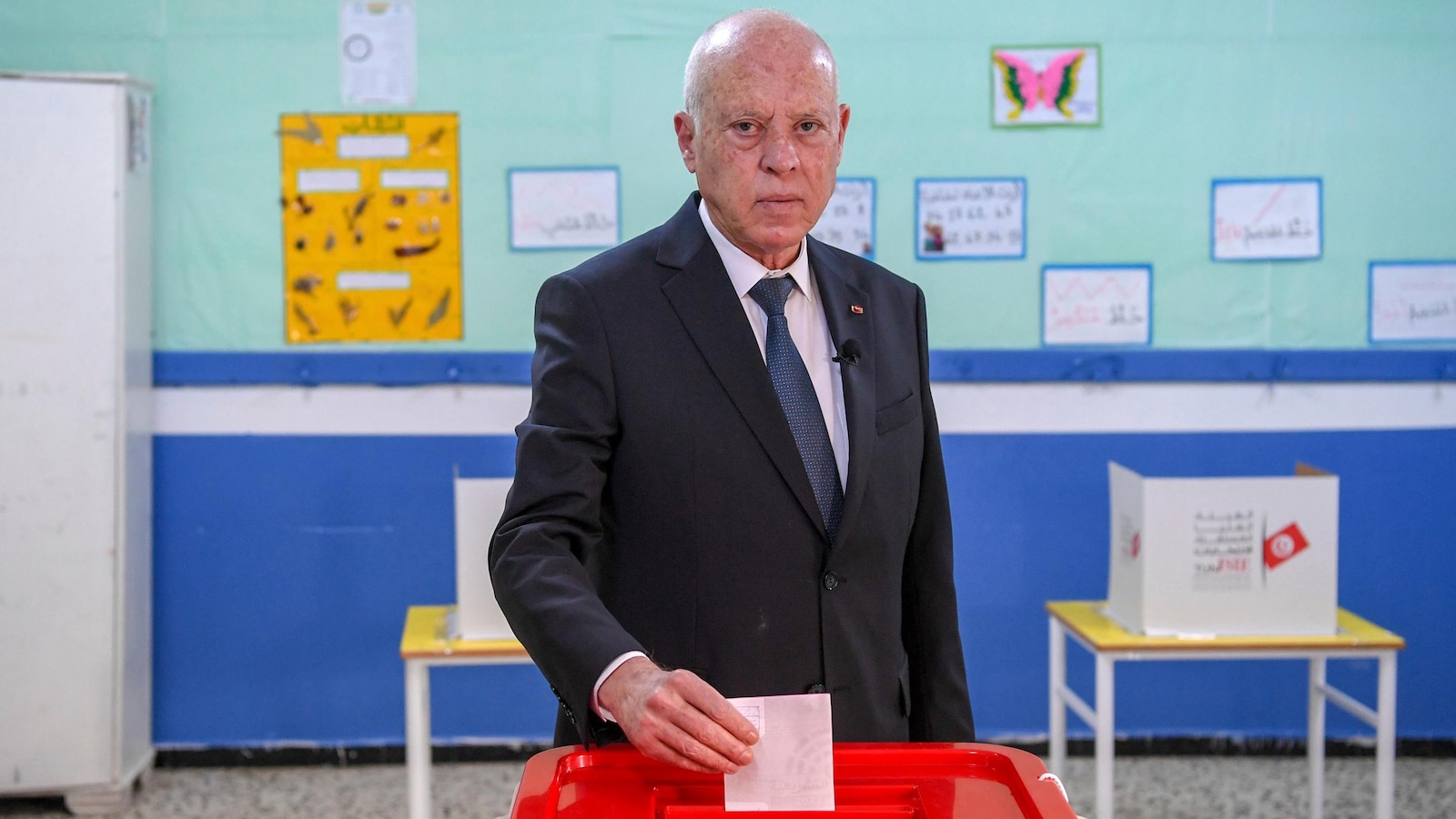Candidates gather signatures for inclusion on the ballot

Tunisian President Kais Saied filed papers Monday to run in the October presidential election, where he is expected to face little competition as potential challengers have been imprisoned during his first term.
Saied submitted 242,224 signatures from registered voters to qualify for inclusion on the Oct. 6 ballot in the North African nation.
Four other candidates have gathered signatures to run including Abir Moussi, a right-wing critic of the president who has been behind bars since she staged a protest outside his residence last year. Her attorneys said they filed her paperwork on Sunday.
Tunisia will publish a complete list of candidates by Saturday. The Independent High Authority for Elections requires candidates gather 10,000 signatures to appear on ballots.
Legal challenges and imprisonment of political opponents
The political landscape in Tunisia has become increasingly fraught with legal challenges and imprisonments of potential presidential candidates. During President Kais Saied’s first term, many of his opponents have found themselves facing legal obstacles, and in several cases, imprisonment. Abir Moussi, a prominent right-wing figure and vocal critic of Saied, is one such example. She was detained following a protest outside Saied’s residence, but despite her incarceration, she managed to gather the necessary signatures to submit her candidacy for the upcoming election. Her lawyers assert that her detention is politically motivated and designed to reduce her electoral chances.
Saied’s administration has frequently been accused by opposition groups of using the legal system to undermine and eliminate political competition. Several other significant figures in the opposition have also faced various charges, ranging from corruption to conspiracy, which critics argue are thinly veiled attempts to consolidate power and stymie dissent.
Tunisia’s judiciary, ostensibly independent, has nonetheless been under intense scrutiny and pressure during this period. Opposition parties and civil society organizations claim that the judiciary’s actions are becoming increasingly politicized, pointing to the rapid prosecution of Saied’s critics as evidence. The Independent High Authority for Elections (ISIE) will play a pivotal role in ensuring the election remains free and fair, but concerns about the impartiality of state institutions persist.
These legal struggles are taking place against a backdrop of broader national turbulence, with many Tunisians questioning the health of their democracy. The imprisonment of political adversaries has sparked condemnation from international human rights organizations, which argue that the government is undermining the democratic principles established after the 2011 revolution that ousted the longtime dictator Zine El Abidine Ben Ali.
Human Rights Watch and Amnesty International have both issued statements urging the Tunisian government to respect political freedoms and ensure that the upcoming election is inclusive and democratic. Whether these calls will influence Saied’s administration remains uncertain.
As the political tension mounts, the conversation in Tunisia and abroad continues to be dominated by questions of legitimacy, the role of the judiciary, and the potential for genuine democratic reform. The outcome of the October election might not only determine the immediate political future of Tunisia but could also serve as a barometer for the state of democracy in the region.
Declining political participation and voter turnout trends
Tunisia’s political trajectory has taken a disconcerting turn, with dwindling voter turnout reflecting a broader disengagement from the democratic process. Following the ouster of long-time dictator Zine El Abidine Ben Ali in 2011, initial optimism gave way to lethargy, as political instability and economic woes took center stage. Last year’s local elections, for instance, saw a paltry turnout of only 11%, a stark indication of waning public interest and investment in the political process.
The precipitous decline in political participation is alarming for several reasons. Firstly, it points to a widespread disenchantment with the current state of governance. Citizens have grown increasingly frustrated with the pace of democratic reforms, job creation, and social services – all of which were crucial promises made during the revolution. As expectations remain unfulfilled, trust in electoral processes and political leaders diminishes.
Several factors contribute to this apathy:
- Economic hardship: High unemployment rates and rising living costs have exacerbated public disillusionment. Many Tunisians prioritize daily survival over political engagement.
- Political infighting: Persistent power struggles among political factions have stalled meaningful progress on critical reforms, leading to a perception of ineffectiveness.
- Judicial concerns: As highlighted in recent reports, the judiciary’s perceived politicization has fostered distrust among the populace.
To address this crisis of confidence, numerous civil society organizations and think tanks have been advocating for enhanced civic education and greater transparency in governance. Initiatives aimed at engaging the youth – a substantial demographic with historically low voter turnout – are being prioritized. These efforts underscore the necessity of reinvigorating Tunisia’s democratic spirit to ensure a robust and participatory political environment.
However, the impending presidential election presents a litmus test for these aspirations. Should voter turnout remain abysmal, it will serve as a grim reaffirmation of the prevailing political malaise. Conversely, a higher engagement rate could signal a resurgence of faith in the electoral process and potentially usher in a new era of political accountability and citizen involvement.
Future assessments of Tunisia’s political health will, therefore, hinge not merely on the outcomes of elections but on the breadth and depth of public participation. Ensuring that all segments of society feel represented and heard is vital for the sustenance and growth of Tunisia’s fledgling democracy.